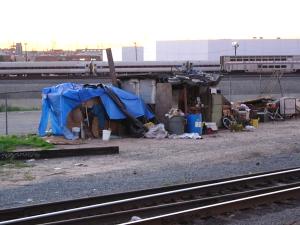 I announced in this blog some 15 months ago that I and my wife Diana would be moving to Los Angeles to be with our children and grandchildren. That move occurred in May of 2017, so we have now been in this sun-drenched city for about 14 months. During nearly all of that time we have been living in a very slow moving construction zone. Our goal has been to convert a two-car garage into a living space that includes a bathroom, a short hallway, and a bedroom. The bathroom and the hallway are part of the original garage, comprising some 350 square feet. The bedroom, which was already set up, albeit in a slightly larger space, is about 120 square feet. Hence our total living space is some 470 square feet, about 1⁄4 the size of our former house in Dallas. To be completely fair, our actual living space will include a 150 square foot outdoor sitting area, complete with table and chairs to take full advantage of the lovely weather here. We are about 1 mile from the ocean in Culver City, so each afternoon brings with it a delightful breeze that cools everything, regularly forcing us to grab a sweater year round. Also, we have built a carport off the bedroom to house our cars, and a deck on the top—maybe 145 square feet—for an additional living space. Thus, we have a total area of about 765 square feet in which to live. Let me quickly say that this is easily enough area to live in and very comfortably indeed!
I announced in this blog some 15 months ago that I and my wife Diana would be moving to Los Angeles to be with our children and grandchildren. That move occurred in May of 2017, so we have now been in this sun-drenched city for about 14 months. During nearly all of that time we have been living in a very slow moving construction zone. Our goal has been to convert a two-car garage into a living space that includes a bathroom, a short hallway, and a bedroom. The bathroom and the hallway are part of the original garage, comprising some 350 square feet. The bedroom, which was already set up, albeit in a slightly larger space, is about 120 square feet. Hence our total living space is some 470 square feet, about 1⁄4 the size of our former house in Dallas. To be completely fair, our actual living space will include a 150 square foot outdoor sitting area, complete with table and chairs to take full advantage of the lovely weather here. We are about 1 mile from the ocean in Culver City, so each afternoon brings with it a delightful breeze that cools everything, regularly forcing us to grab a sweater year round. Also, we have built a carport off the bedroom to house our cars, and a deck on the top—maybe 145 square feet—for an additional living space. Thus, we have a total area of about 765 square feet in which to live. Let me quickly say that this is easily enough area to live in and very comfortably indeed!
This week, Diana and I put up our pictures, as many as our few walls would allow, cooked our first meal on our lovely new appliances, and tonight will welcome our first guests for dinner—our grandchildren and daughter-in-law—who live about 30 feet from our front door. In short, the work on the inside of our house is complete, and we love its beauty, its convenience, its quiet, and its immediate sense of home. Though the carport and deck are not quite complete, the next two to three weeks should bring their completion, too. To be sure, we do not have enough closet and cabinet space to accommodate all that we moved with, even though we sold or gave away 7/8 of what we had in our former home. Goodwill has gotten familiar with our faces over the past week, accepting some items scorned by family and friends. I suppose this could be termed a “tiny house”, but it so far does not seem tiny to us. In fact, it seems just about right. We feel like king and queen in what we have named “The Garage Mahal,” though I hasten to add it is far from a glorified mausoleum.
I could go on describing our new home’s wonders—my, that bathroom/shower is heavenly!—but I am offering to you a brief look at where we will be living, we hope, until the end of our earthly journeys. I wish to contrast our small but evident luxuries with the pain and hopelessness of homelessness, a horrifying and growing problem in our adopted city. It is notoriously difficult to gain an accurate count of those who are homeless due to their obvious transience and reluctance to be counted because of mental illness, fury at their situation, and any number of other reasons. In Los Angeles, an immense city of at least 10,000,000 people, there are no fewer than 55,000 people who should be considered homeless. It is by far the largest such population in our country. This is a fact due to many issues, but two spring to mind. LA is the last stop on the way west, butting up to the Pacific Ocean. Those who are poor, profoundly poor, upon reaching this city, can go no further. And of course there is the weather, nearly always temperate, with very little rain. Hence, it is more comfortable outdoors here than in any other large metropolis. And because the citizens of LA are in general more concerned about those among them with little with which they can live—LA is in the main a progressive, liberal place—the voices of the homeless speak louder, and are heard more seriously, than in some other cities.
 Unfortunately, that does not mean that our homeless population is always well treated or even taken seriously. We have our share of those who fight tooth and claw against shelters and/or housing for the homeless “in their backyards.” Hardly a day goes by when the Los Angeles Times, the newspaper of record, does not carry a story about groups in one or another neighborhood shouting at their city’s officials about where the next shelter should or should not be constructed. They may extoll their desires to help the homeless, but they will not have them housed anywhere near where they live. There are property values to consider, and however cruel such talk appears to be, the value of property in this city is ridiculously high, and each square foot comes at a premium. High property values exacerbate the homeless problem, of course, and land entrepreneurs are ever on the lookout for the next money making piece of land. After all, each piece of property that is given over to the homeless is one more piece that cannot help someone make much more money.
Unfortunately, that does not mean that our homeless population is always well treated or even taken seriously. We have our share of those who fight tooth and claw against shelters and/or housing for the homeless “in their backyards.” Hardly a day goes by when the Los Angeles Times, the newspaper of record, does not carry a story about groups in one or another neighborhood shouting at their city’s officials about where the next shelter should or should not be constructed. They may extoll their desires to help the homeless, but they will not have them housed anywhere near where they live. There are property values to consider, and however cruel such talk appears to be, the value of property in this city is ridiculously high, and each square foot comes at a premium. High property values exacerbate the homeless problem, of course, and land entrepreneurs are ever on the lookout for the next money making piece of land. After all, each piece of property that is given over to the homeless is one more piece that cannot help someone make much more money.
As I move into my Garage Mahal and gaze it its obvious luxuries, I need always to think of my homeless brothers and sisters who, far from anything like luxury, will search today for a place to wash themselves and find something to eat. Believe me, I hope never to take our Garage Mahal for granted, to savor its beauties, and to use its safe and attractive spaces to refuel myself for the struggles for equality and justice for all of earth’s inhabitants. It is so easy, as I sit in air conditioned quiet comfort, typing these words on my laptop looking forward to a lunch of my own choosing, available to me in my new refrigerator or heated in my new microwave, to forget that not far from my front door, there are human beings who are homeless, and perhaps hopeless, who are anxious to find a safe place where they can rest and sleep. “Inasmuch as you do it to the least of these, my brothers and sisters, you do it to me,” the one we call Christ was quoted as saying. They are haunting words, and they float and prod me here in my new Garage Mahal.
(Images from Wikimedia Commons)











